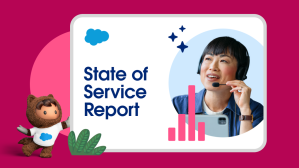Key Takeaways
- By 2027, AI is expected to handle half of all customer service cases — up from just 31% today.
- That sharp climb reflects a broader shift underway: AI has leapt from the margins to the mainstream, becoming the top priority for Australian service leaders.
- New research from Salesforce’s 7th State of Service report also reveals how AI is transforming front-line responsibilities and career opportunities as businesses evolve into agentic enterprises.
According to a new global survey of 6,500 service professionals — including 250 in Australia and 50 in New Zealand, part of 1750 respondents across APAC — AI is no longer just automating decision trees, it’s reshaping how service teams spend their time, grow their careers, and meet customer expectations.
So what does this shift look like in practice? Here are three key trends, according to Salesforce’s newest State of Service report.
AI leaps in priority as service teams eye gains in speed, cost, and customer satisfaction
AI has vaulted up the priority list for Australian service leaders — from outside the top ten to number one in just a year.
“AI is now the undeniable, number one priority for Australian service leaders as our local organisations evolve and elevate their customer experience approaches,” said Jane Brown, SVP Sales, Salesforce in ANZ. “ This monumental shift to the ‘agentic enterprise’ will free up valuable human talent to focus on complex problem-solving, developing new skills, and capturing high-value opportunities.”
This shift is already underway: Australian service teams estimate 31 per cent of cases are currently handled by AI. By 2027, as AI agents — or digital labour – gain momentum, they project that figure will reach 60 per cent. This transition reflects the emergence of the agentic enterprise, where AI agents work alongside human teams as collaborative partners, reasoning and acting independently to handle routine tasks while employees focus on more complex, higher-value work.
Beyond resolving more cases, teams are betting on AI agents to amplify their impact, from cutting service costs to improving customer satisfaction. Australian service professionals project that agentic AI will boost upsell revenue by 15 per cent, while in New Zealand the potential revenue increase is 20 per cent.
Reps with AI report less rote work, more growth opportunities, and a brighter career outlook
Aside from organisation-level gains, AI is reshaping individual service reps’ experiences at work. APAC reps using AI spend 20 per cent less time on routine cases — freeing up an estimated four hours per week for more complex work. That means less time handling password resets and status updates and more time making nuanced judgment calls and managing tricky exceptions. APAC reps with agentic AI spend even more time on high-complexity cases, dedicating 25 per cent of their week to the thorniest issues.
Service reps with agentic AI spend a quarter of their week on highly complex issues
With AI agents taking on more cases, service reps have more time for other priorities — and every minute counts. As Robert Sutton, Commercial Director for Sutton Tools noted, providing more time for service teams is a big win. “Our implementation of Agentforce on Service Cloud is allowing us to scale our service operations effectively, providing a means of augmenting our customer service teams with digital labour that will help reduce call volumes by an anticipated 20%.”
“By taking on tasks like providing product and inventory information autonomously, Agentforce will enable our teams to concentrate on personalised support and complex issues, rising to the challenge of meeting increased customer expectations, while we navigate the same challenges many service leaders called out in this research, such as operational costs, talent shortages and resolution times.”
That extra time adds up. Compared with Australian and New Zealand non-users, agentic, AI-enabled service reps are significantly more likely to mentor colleagues, lead cross-functional projects, and improve processes. They’re also more likely to work with high-value customers and take on leadership roles, showing how AI can open doors for more impactful, career-building work.
In fact, 84 per cent of APAC service reps with AI say it’s creating growth opportunities. Specifically, 91 per cent of Australian service reps have developed new skills, and 92 per cent say their role has gotten more specialised as a result of working with AI tools. Most importantly, APAC service reps with AI feel good about where they’re headed, with agentic AI users being the most optimistic about their career prospects. This may reflect a selection bias among future-focused early adopters, but it aligns with their reported skill-building, specialisation, and leadership opportunities.
As organisations roll out AI, security and accuracy remain top of mind
While service reps agree that AI is a lever for growth and opportunity, AI implementation does come with challenges. Still, 95 per cent of Australian and 86 per cent of New Zealand service leaders say the obstacles they’ve faced were expected, and in many cases, less challenging than anticipated. Security remains the top concern, with 46 per cent of Australian and 62 percent of New Zealand service leaders saying security concerns have delayed or limited their AI initiatives.
“While AI is the clear number one priority for Australian service leaders, the top challenge they face during implementation remains security concerns,” said Brown. “These results provide a clear path forward: Australian enterprises that ground these implementations in a foundation of security and trust can ensure they are safely accelerating their adoption of agentic AI, turning their investment into measurable business value and overcoming siloed complexity.”
Go deeper:
- Read the full State of Service report
- Learn how new Agentforce Service updates help teams slash support costs and build customer loyalty
- Hear how service leaders from 1-800 Accountant and Salesforce are preparing their organisations for the future in this webinar
- Discover how Service Cloud helps service teams across every industry
- Join the Serviceblazer Community
- Find more insights on the Salesforce Stat Library
Methodology:
Data is sourced from a double-anonymous survey of 6,500 service professionals and decision makers conducted from April 25 through June 6, 2025, including 250 in Australia and 50 in New Zealand. Respondents represented Argentina, Australia, Austria, Belgium, Brazil, Canada, Chile, Colombia, Czech Republic, Denmark, Finland, France, Germany, Greece, India, Indonesia, Ireland, Israel, Italy, Japan, Mexico, Netherlands, New Zealand, Norway, Peru, Philippines, Poland, Portugal, Saudi Arabia, Singapore, South Africa, South Korea, Spain, Sweden, Switzerland, Thailand, Turkey, United Arab Emirates, United Kingdom, and the United States.















